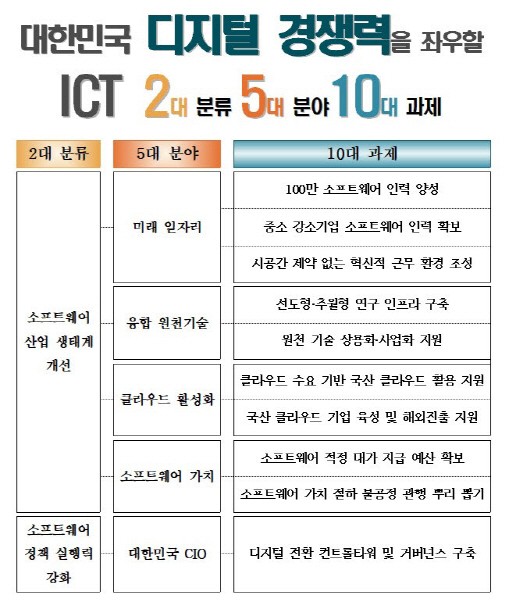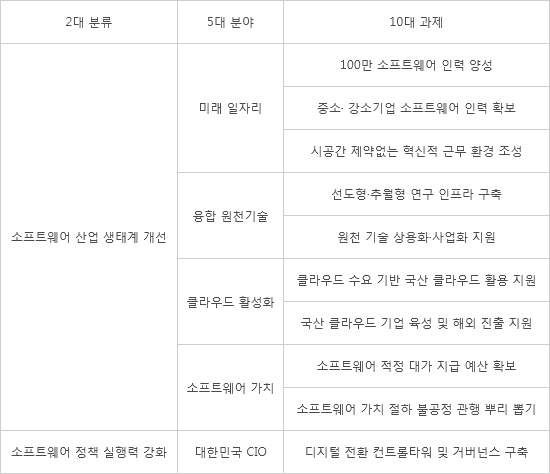
The software (SW) industry has proposed 'raising 1 million software manpower, compulsory remote development, and establishing a chief digital innovation in the presidential office' as software policy pledges to Deobooleoh (‘together with’) Democratic Party of Korea.
Korea Software Industry Association, consists of 14 associations including the Korea Software Industry Association, Software Financial Cooperative, Korea IT Business Promotion Association, Korea IT Service Industry Association, Korea Software and ICT Federation, Korea Commercial Software Association, etc., delivered a 'SW Policy Proposal' was delivered to the democratic party of Korea.
Key lawmakers and officials of the Democratic Party of Korea, including Wan-joo Park, Chairman of the Policy Committee of the Deobooleoh Democratic Party of Korea, Won-wook Lee, Chairman of the Science, ICT, Broadcasting and Communication Committee, Seung-rae Cho, secretary of the Science, ICT, Broadcasting and Communication Committee, Rep. Pil-mo Jung, Rep. Yong-bin Lee, and a senior expert member Jung-sang Ahn.
The Korea Software Industry Association’s policy proposal regards to the presidential election. The proposal had two main categories in improving of the SW industry ecosystem and strengthening of SW policy execution capabilities. They consist of 10 requested tasks in 5 areas, such as creating future jobs, securing convergence source technologies, activating the cloud, recognizing software value, and introducing the Republic of Korea Chief Information Officer (CIO).
Major tasks for future job creation focus on 'cultivating 10 million SW manpower' through 9he expansion of universal SW education in elementary, middle and high schools, and the expansion of university SW quota and scholarships. The proposal also focused on 'Securing small and medium-sized enterprises and small and medium-sized enterprises (SW) manpower' by expanding the recruitment-confirmed training course and introducing a mandatory service system in small and medium-sized enterprises (SMEs) for an alternative way of completing mandatory military service.
In the field of recognizing software value, the proposal requested to secure a sufficient budget considering the value and characteristics of software. It also requested 'rooting out unfair practices' through mandatory maintenance rate compliance, compulsory development of remote locations, and compulsory task review committees.
It reflected the long-cherished desire to improve development efficiency through remote development, and go beyond from raising the maintenance rate of domestic software, which is significantly lower than foreign software by 11%, and the head counting method of checking the number of manpower.
In the field of CIO adoption in Korea, the task was to establish a digital transformation control tower and governance, such as the establishment of a digital innovation chief in the presidential office, a digital innovation department, and the National Digital Innovation Promotion Committee.
Jun-hee Cho, president of the Korea Software Industry Association, delivered policy proposals on behalf of The Korea Software Industry Association’s said, “Digital transformation is an unavoidable trend, and SW-based digital flow is emphasized as a global trend. SW competitiveness is global competitiveness, and the next government needs to establish the SW Promotion Act and solve the shortage of manpower.”
He said, “It is necessary to raise 1 million SW talents necessary for large-scale investment in the SW industry, and supply of digital manpower for all industries. Paying a fair price for software and introducing a Korean CIO is also something the next government should do.”
Chairman Wan-joo Park said, “Leaping to a leading country through the digital economy is a solution that can simultaneously solve the economic recovery after the pandemic and the job enlargement. We will pay more active attention in policy to the software industry, which is the core of the digital economy.”
Secretary Seung-rae Cho said, “There is an abnormal toxic cycle from regions not having enough SW manpower, so the research institute or office is moved to Seoul, which causes talents to move to Seoul to find a job. It is necessary to build a strategy for nurturing one million talents in connection with how to secure talents at the local level.”
Rep. Pil-mo Jung said, "Since it is an era in which software determines national competitiveness, SW-related governance re-establishment and industry promotion measures must be presented together. This election will be an opportunity to bring a turning point.”
Rep. Yong-bin Lee said, “Politics should give hope, and hope should be supported by consensus. I ask the government and the software industry to make an effort to provide of 1 million jobs that can solve both youth jobs and polarization at the same time.”
The Korea Software Industry Association plans to deliver software policy proposals to opposition parties such as the People's Power Party.
SW policy proposal

By Staff Reporter Ho-chun An (hcan@etnews.com)